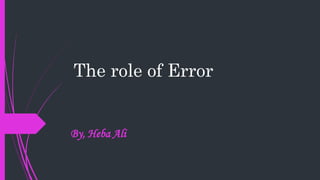
The role of error
- 1. The role of Error By, Heba Ali
- 2. Mistakes are often divided into errors and slip. Errors happen when learners try to say something that is beyond their level of the language. Usually learners cannot correct errors themselves because they don’t understand what is wrong. Slips are the result of tiredness, worry or other temporary emotions or circumstances. These kinds of mistakes can be corrected by learners once they realize they have made them. There are two main reasons why second learners make errors;
- 3. 1- the influence of the learner’s first language to the second language. This is called interference or transfer. Learners may use the sound patterns or grammatical structure from their own language in English. 2- because learners are unconsciously working out and organizing language , but this process is not yet complete. This kind of error is called developmental error. the learners who made this kind of errors are often similar to those errors which made by a young first language speakers as a part of their normal language development.
- 4. Developmental errors and errors of interference can disappear by themselves without correction, as the learner learns more language. Sometimes errors do not disappear, but get ‘Fossilised’. Fossilised errors are errors which a learner does not stop making and last for a long time or even for ever, in the learner’s foreign language use. These Fossilised errors may be the result of lack of exposure to the second language and of a learner’s lack of motivation to improve their level of accuracy.
- 5. As a teacher you would prefer to follow these tips when a student make mistakes; 1- give the student the chance to correct themselves:- Mistakes are of different kinds, some are only slips of the tongue, something which the student knows and will usually get right; some are the result of under-learning or over-learning and some as a result of students who completely misunderstanding the aspect of the language or the instructions of a particular practice they are required to do. But if the teacher jumps in immediately with a correction for the previous points, the student will lose the opportunity for a real understanding.
- 6. 2- Involve the class; If the student is not able to provide self-correction the teacher should invite other students in the class to comment before providing the correct language, this way helps to keep all the class involved. By correcting each other it makes clear that language learning for them is a corporate activity and it reduces the element of teacher domination and over-zealous correction. 3- the student must use the correct language; If a student made a mistake and another student provides the correct answer, the teacher must invite the student who made the mistake to say the complete the correct form.
- 7. The End of the session
